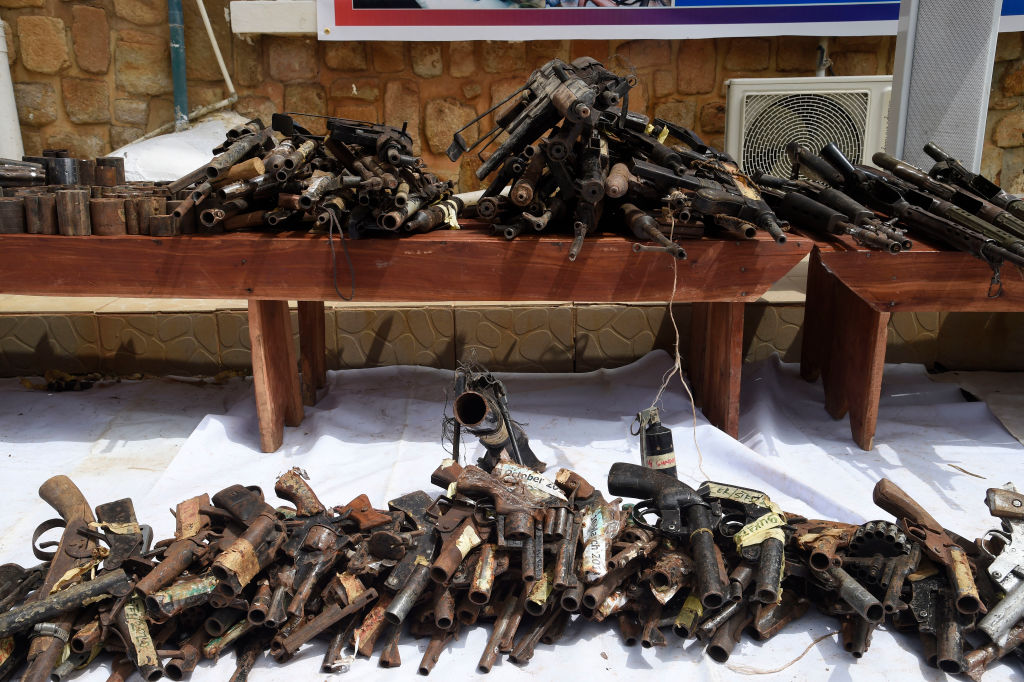Study: Political Chaos Leads to SALW Spread
ADF STAFF
Decades of warfare, corruption and ethnic conflict have left West Africa awash in small arms that continue to fuel instability and extremism across the region.
Although numbers are difficult to pin down, some experts estimate that as many as 8 million small arms and light weapons (SALW) circulate across the region despite a 2006 convention on the international trade in small weapons by the Economic Community of West African States (ECOWAS).
Some of those weapons originate in national military stockpiles and are either stolen, captured or retained after Soldiers leave service. A small number are manufactured within the region, but most have come from outside — sometimes from Russia or China, but also from Libyan arsenals looted after the 2011 fall of Moammar Gadhafi.
They move from conflict to conflict, traveling traditional smuggling routes alongside drugs and other contraband. Wherever they go, ethnic tensions or political disagreements erupt into violence.
“The widespread availability of small arms to abusive actors poses a threat of unprecedented magnitude to West Africa,” analyst Francis Langumba Keili wrote in a report for the United Nations Institute for Disarmament Research. “The insidious nature and impact of these weapons affects all aspects of society.”
Recent research suggests there is one factor that can lessen the appeal of SALW: faith in government. More precisely, people who believe in the legitimacy of their government are less likely to seek out weapons, making it easier for governments to enforce the ECOWAS ban, according to researcher Daniel Banini of Eastern Illinois University.
“When a state is seen as legitimate, it’s because those who hold power got it in widely accepted ways and wield it rightfully,” Banini wrote recently for The Conversation. “A lack of legitimacy can lead to illegal purchases of small arms and light weapons.”
As a result, military coups in Burkina Faso, Guinea and Mali may actually perpetuate the kind of unrest coup leaders sought to quell because they lack political legitimacy.
“Where a state does not act legitimately, organized political opposition and sustained armed struggles or insurgencies follow,” Banini wrote. “When a government lacks popular support, it will use strong-arm tactics like illegally obtaining small arms and light weapons to rule.”
Banini cites Côte d’Ivoire as an example of a country where a lack of political legitimacy undercut the ability to control SALW within its borders.
Former President Laurent Gbagbo took power in 2000 after then-junta leader Robert Guéï banned other political rivals from running. Between 2000 and 2011, Gbagbo’s government bought more than $16.3 million in illegal weapons, making it one of the biggest violators of the ECOWAS small arms ban. Legal weapons purchases also grew by 50% during his tenure.
Legitimacy issues around elections provoked two Ivoirian civil wars between 2002 and 2011, further driving the demand for small arms. Gbagbo refused to enforce the small arms ban when it formally took effect during his rule.
“Weakened political legitimacy in Côte d’Ivoire sidetracked compliance by diverting Gbagbo’s focus and rerouting opposition energy towards grabbing political power, which requires more weapons,” Banini wrote.
When Gbagbo refused to concede the presidency to Alassane Ouattara after the 2010 election, more illegal weapons flowed into the country as Ouattara’s supporters drove Gbagbo from power.
Ghana, on the other hand, shows how a strong sense of political legitimacy creates the stability needed to enforce the ECOWAS small-arms convention, according to Banini.
“In Ghana, no known evidence exists of Ghanaian authorities or organized groups purchasing weapons illegally,” Banini wrote. “Ghana’s relative state legitimacy is grounded in the elite’s willingness to regulate the competition for political power.”
The cases of Côte d’Ivoire and Ghana support the idea that governments perceived as legitimate have more capacity to prevent the spread of SALW and the violence associated with them, according to Banini.
“The findings suggest that political legitimacy is important for states’ ability to implement collective security agreements such as the one on small arms and light weapons,” Banini wrote. “ECOWAS members with legitimacy challenges must be given support around implementation, because they cannot do this individually.”


Comments are closed.